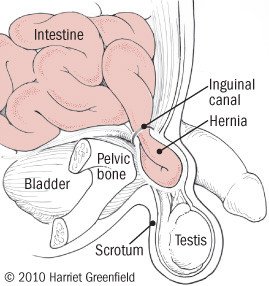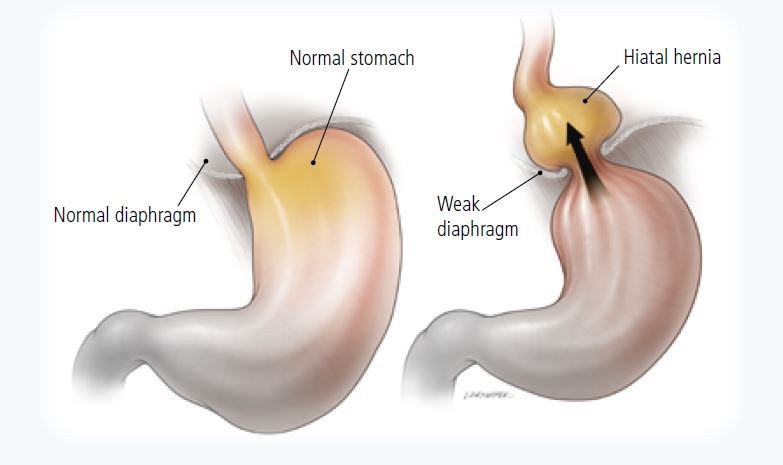Hernia
Medically reviewed by Drugs.com. Last updated on Jul 14, 2025.
What is a Hernia?

A hernia occurs when part of an internal organ or body part protrudes through an opening into another area where it ordinarily should not be located. There are many different types of hernias, but the most common is when a portion of the intestine protrudes through a weak area in the muscular wall of the abdomen. This causes an abnormal bulge under the skin of the abdomen, usually near the groin or the navel.
Hernias occur in various locations. Some hernias are present at birth, while others develop during adulthood. Hernias may enlarge due to increased pressure inside the abdomen, such as during straining, persistent coughing, obesity, or pregnancy.

- Inguinal hernia — A portion of intestine or internal fat protrudes through a weakness in the inguinal canal. The inguinal canal is a natural passageway through the abdominal wall in the groin. In males, the inguinal canal contains the blood vessels that go to the testicle and the duct that carries sperm from the testicle. Inguinal hernias account for 75% of all hernias and are five times more common in males than females. They may be present in infants but can develop in adults also.
- Femoral hernia — This is a hernia through the passage that contains the large blood vessels (the femoral artery and vein) between the abdomen and the thigh. This type of hernia causes a bulge in the upper thigh just under the groin and is more common in women than men.
- Epigastric hernia — A small bit of fat bulges through a weakness in the upper abdominal muscles between the navel and breastbone. Most people with such hernias are between ages 20 and 50. These hernias are often so small that they may go unnoticed.
- Umbilical hernia — Intestine or fat bulges through the abdominal wall under the navel. The area of weakness in the abdominal wall can be very small (less than half an inch) or it can be as large as 2 to 3 inches. Umbilical hernias are common in newborns but may disappear gradually over time. They may also occur in adults who are overweight or in women who have been pregnant many times.
- Incisional hernia — Intestine bulges through a weakness in the abdominal wall in an area where there has been previous surgery. The skin has healed, but the underlying muscle has pulled apart, resulting in a hernia. These hernias can be small or quite large.
- Ventral hernia — This is a general term that can refer to an epigastric, umbilical, or incisional hernia.
- Hiatus hernia — This hernia involves the stomach rather than the intestine. The stomach slips upward through the normal opening in the diaphragm and passes into the chest. It is often associated with acid reflux, or gastroesophageal reflux disease (GERD), which causes heartburn.

Symptoms
Most hernias cause a bulge under the skin (except hiatus hernias). The location of this bulge depends on the specific type of hernia. For example, an inguinal hernia appears as a bulge in the groin, while an umbilical hernia appears as a bulge near the navel. Some hernias can cause twinges of pain or a pulling sensation, but most do not cause pain. Hernias are usually easier to see with coughing or straining. They also tend to be more prominent with standing and often disappear with lying down.
A hernia is considered incarcerated if a portion of intestine becomes trapped in the hernia and is unable to slide back into the abdomen. Rarely, the trapped intestine can strangulate. This means that the contained intestine dies because its blood supply has been cut off by the constriction of the hernia. This causes severe pain and requires urgent surgery.
Diagnosis
Most people discover their own hernias by noticing a bulge. Sometimes, however, your doctor will find a small hernia as part of a routine examination. Your doctor makes the diagnosis by physical examination. He or she may ask you to strain or cough (especially while standing), which may make the bulge easier to see or feel.
Rarely, you may have symptoms that suggest a hernia, but the doctor will be unable to find one at the time of examination. In these circumstances, your doctor may recommend a computed tomography (CT) scan or an ultrasound of the abdomen.
Expected duration
Most hernias stay the same or slowly get larger over time. Umbilical hernias, however, are a special situation. Most small umbilical hernias that appear before a baby is 6 months old will disappear before the child's first birthday. Even larger umbilical hernias may disappear before age 3 or 4.
Prevention
Losing weight is helpful if you are overweight. If you frequently need to strain when you move your bowels, speak to your doctor. Your doctor may prescribe stool-softening medication or suggest that you modify your diet to include more high-fiber foods.
Treatment
Although not all hernias need to be operated on, hernias that cause symptoms or that become larger should be repaired by a surgeon. The technique used to repair your hernia depends on its type, size, and location. The surgical options include:
- simply stitching the defect closed
- using mesh plugs or patches to repair the defect
- performing laparoscopic surgery to fix the defect (the surgeon makes a small incision in the skin and performs the surgery using a telescope).
If you are considering having a hernia repaired, you and your surgeon will discuss which technique is most appropriate for you.
Hernias that become incarcerated or strangulated require immediate medical attention. Your doctor will try to massage the hernia back through the hole in which it is stuck. If this cannot be done, emergency surgery may be needed. Otherwise, most hernia repairs can be done on an outpatient basis as a non-emergency.
Umbilical hernias in infants usually are not treated surgically unless the hernia continues past the child's third or fourth birthday, becomes larger, causes symptoms, or strangulates. Umbilical hernias are more likely to need surgery if the opening through which the hernia passes is greater than 2 centimeters in diameter.
Hiatus hernias that are not causing symptoms of acid reflux do not need to be treated. When symptoms occur, medicine may be prescribed to decrease acid reflux. Surgery may be recommended for large hiatus hernias that cause continuing symptoms or for hernias that become stuck inside the chest.
When to call a professional
Call your doctor right away if there is significant pain at the site of a hernia. This can be the first sign that a hernia is incarcerated or strangulated. See your doctor if you notice a new, painless lump or swelling in a location where hernias typically occur.
Prognosis
When surgery is used to repair hernias, the outlook is generally very good.
Additional info
American College of Surgeons (ACS)
https://www.facs.org/
Further information
Always consult your healthcare provider to ensure the information displayed on this page applies to your personal circumstances.
